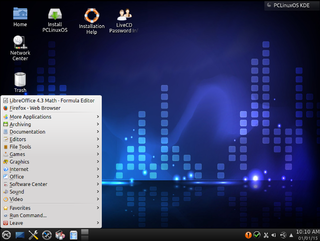It is proposed that this article be deleted because of the following concern:
If you can address this concern by improving, copyediting, sourcing, renaming, or merging the page, please edit this page and do so. You may remove this message if you improve the article or otherwise object to deletion for any reason. Although not required, you are encouraged to explain why you object to the deletion, either in your edit summary or on the talk page. If this template is removed, do not replace it . The article may be deleted if this message remains in place for seven days, i.e., after 22:06, 11 December 2018 (UTC). Nominator: Please consider notifying the author/project: {{subst:proposed deletion notify |TinyMe|concern=Not at all notable, as confirmed by searching for sources. Even the distribution's own site (the only one cited in the article) is dead.}} ~~~~ |
This article has multiple issues. Please help improve it or discuss these issues on the talk page . (Learn how and when to remove these template messages) (Learn how and when to remove this template message)
|
 TinyMe 2008.1 | |
| Developer | KDulcimer |
|---|---|
| OS family | Unix-like |
| Working state | EOL |
| Source model | Open source |
| Latest release | TinyMe 2008.1 "Droplet" / December 9, 2008 |
| Kernel type | Monolithic kernel |
| Official website | tinymelinux.com |
TinyMe is a lightweight Unity Linux-based operating system, using the Openbox window manager. It is aimed at making the computing experience as bloat- and lag-free as possible and is well-suited to older computers, enthusiasts devoted to small/fast systems, or users who just want a minimal environment. TinyMe is comparable to other lightweight Linux distributions like Puppy Linux, TinyCore Linux, Damn Small Linux and Feather Linux.

An operating system (OS) is system software that manages computer hardware and software resources and provides common services for computer programs.

Openbox is a free, stacking window manager for the X Window System, licensed under the GNU General Public License. Originally derived from Blackbox 0.65.0, Openbox has now been totally re-written in the C programming language and since version 3.0 is no longer based upon any code from Blackbox.

Puppy Linux is an operating system and lightweight Linux distribution that focuses on ease of use and minimal memory footprint. The entire system can be run from RAM with current versions generally taking up about 210 MB, allowing the boot medium to be removed after the operating system has started. Applications such as AbiWord, Gnumeric and MPlayer are included, along with a choice of lightweight web browsers and a utility for downloading other packages. The distribution was originally developed by Barry Kauler and other members of the community, until Kauler retired in 2013. The tool Woof can build a Puppy Linux distribution from the binary packages of other Linux distributions.
The distribution produces two Live CD ISO images. The larger, codenamed "Acorn", is a 200 MB ISO image. The other, "Droplet", is a 150 MB ISO image. Both can be installed onto a hard drive or a USB flash drive.

A USB flash drive, also known as a thumb drive, pen drive, gig stick, flash stick, jump drive, disk key, disk on key, flash-drive, memory stick, USB key, USB stick or USB memory, is a data storage device that includes flash memory with an integrated USB interface. It is typically removable, rewritable and much smaller than an optical disc. Most weigh less than 1 oz. Since first appearing on the market in late 2000, as with virtually all other computer memory devices, storage capacities have risen while prices have dropped. As of March 2016, flash drives with anywhere from 8 to 256 GB were frequently sold, while 512 GB and 1 TB units were less frequent. As of 2018, 2TB flash drives were the largest available in terms of storage capacity. Some allow up to 100,000 write/erase cycles, depending on the exact type of memory chip used, and are thought to last between 10 and 100 years under normal circumstances.
